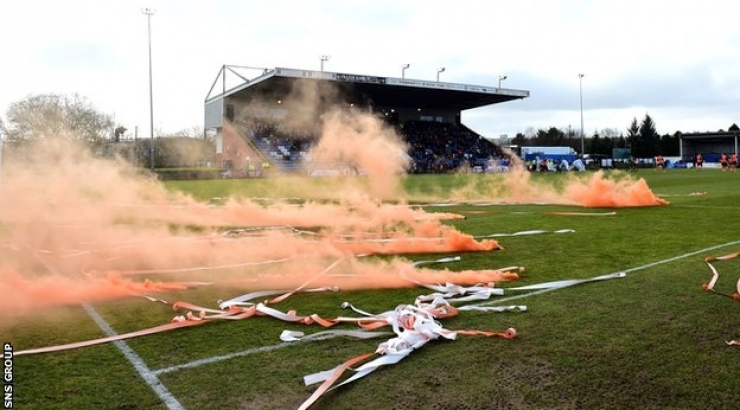
SPFL discusses face recognition system for unacceptable conduct
The Scottish Professional Football League is considering the use of facial recognition technology at stadiums to help combat anti-social behaviour.
The SPFL has set up a working group to examine the issue of unacceptable conduct.
And it is understood that they would seek financial assistance from the Scottish government.
The facial recognition system was mentioned at a meeting of all 42 clubs on Tuesday.
The debate over the extent to which clubs should be held accountable for the conduct of their followers has been sparked by recent incidents involving Rangers, Celtic and Dundee United supporters.
Hibernian's visit to Ibrox on 28 December was marred by sectarian chants from the home end, while there were complaints of sectarian songs during Celtic's Scottish Cup trip to Stranraer.
Celtic and Dundee United have both condemned their own fans for setting off pyrotechnics.
SPFL board member Mike Mulraney revealed there was not appetite to introduce new strict liability rules.
The Alloa chairman said there is "no chance whatsoever" of clubs agreeing to regulations that could see them punished for the conduct of supporters regardless of whether the club itself is to blame.
A spokesman for the league body said: "The SPFL is working with government and other partners with the aim of establishing a workable solution to help rid our football grounds of unacceptable conduct.
"This work is at an early stage and is not being led by any one club.
"The issue of unacceptable conduct is something that the SPFL, its board and its member clubs are absolutely committed to addressing.
"Recognising that certain behaviours are for society to face and address as a whole, we believe football can take a leading role in moving this issue forward for Scottish society."
The prospect of facial recognition technology has been met with scepticism from the Scottish Football Supporters' Association.
Chairman Simon Barrow said the fans' group is concerned by "a rushed move towards intrusive surveillance".
He added: "There needs to be careful consultation with fans and clubs, alongside wider consideration of how to deal effectively and proportionately with threatening and insulting behaviour.
"The best way forward will involve working with the great majority of supporters who deplore such abuses, rather than making them feel under accusation themselves."







